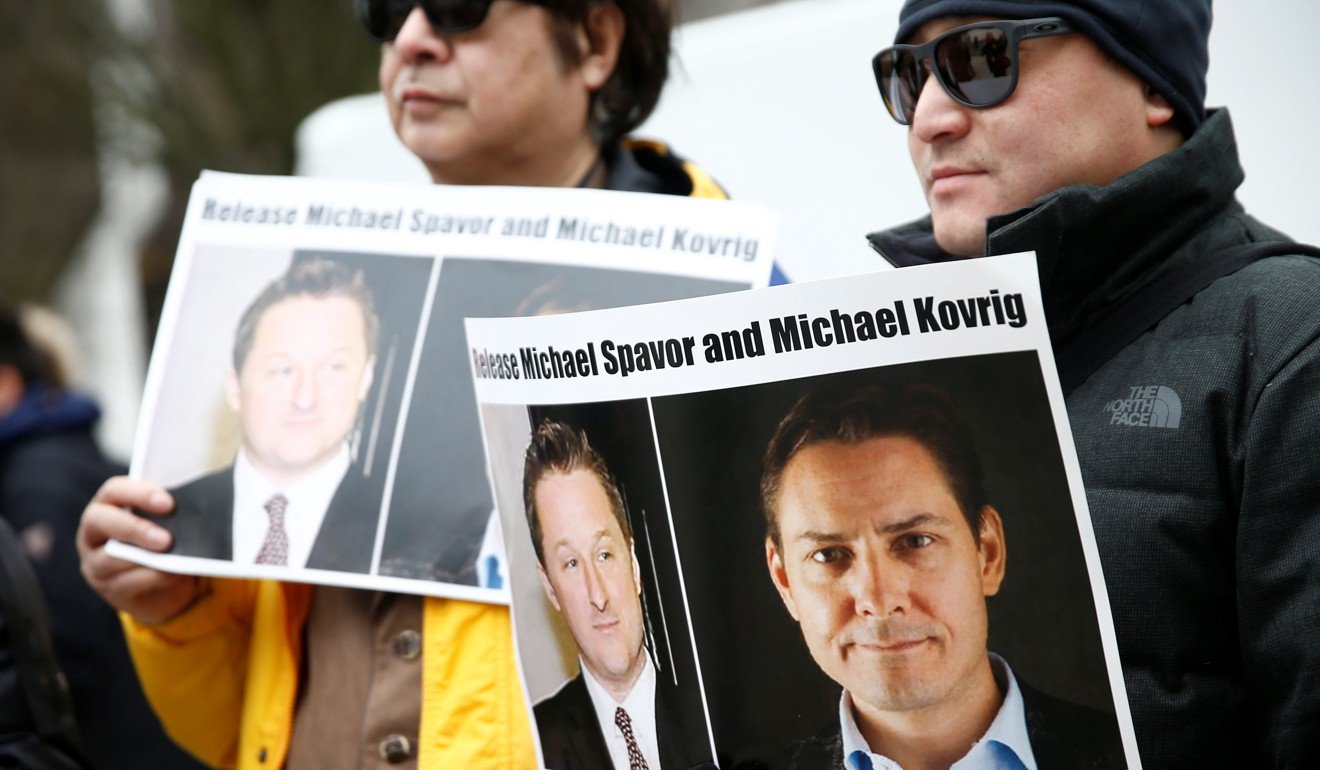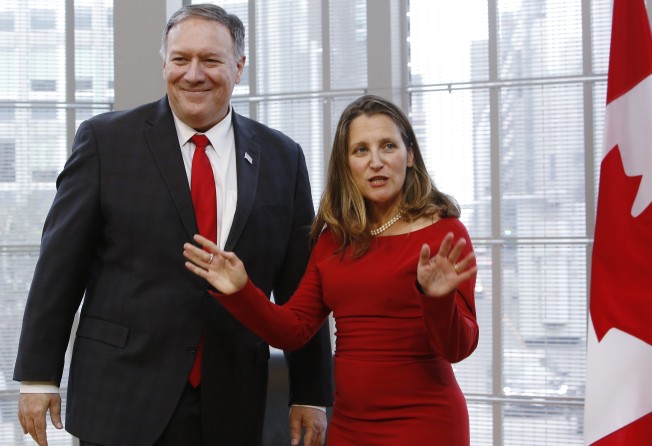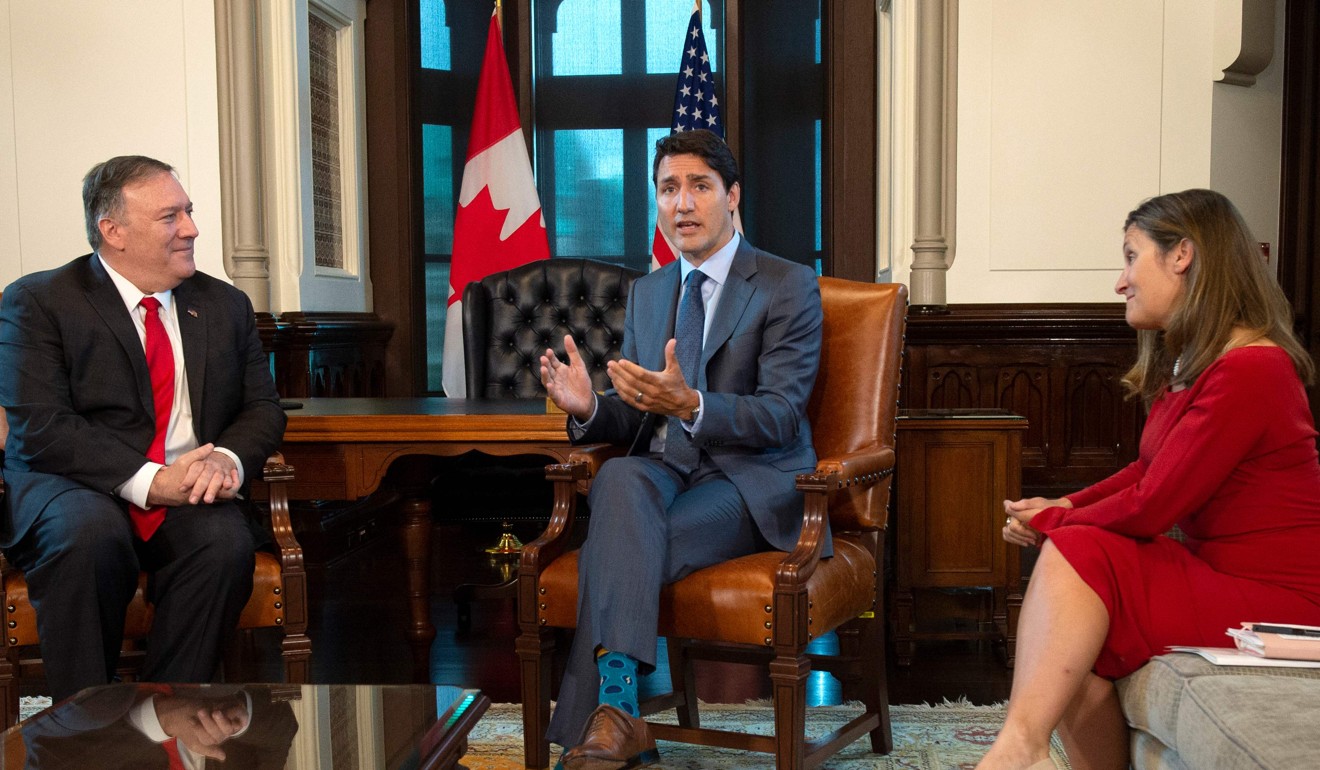
Mike Pompeo says US is pressing China to release detained Canadians, but rejects linkage to Huawei case
- US Secretary of State, meeting with Canadian counterpart Chrystia Freeland, calls the two cases ‘fundamentally different’
- Freeland deflects Beijing’s call to end ‘wanton criticism on Hong Kong’, saying ‘it is only natural and important for Canada to keep a close eye’

Washington’s No 1 diplomat said on Thursday that the US would continue to pressure China to end its “unlawful detention” of two Canadians held on espionage charges, but rejected suggestions that the US might end its extradition case against a Chinese executive in return for their release.
“While I can’t talk about everything that we’ve done, we’ve started with being immediately very clear about the inappropriate nature of this unlawful detention of these two Canadian citizens,” said US Secretary of State Mike Pompeo during a joint news conference in Ottawa with Canadian Foreign Minister Chrystia Freeland.
Michael Spavor and Michael Kovrig were detained in late 2018 and accused of acting together to steal trade secrets from China. Their arrests were widely seen as retaliation for the earlier arrest in Vancouver of Huawei executive Meng Wanzhou at the request of the US government, which is seeking to extradite her on fraud charges.
Pompeo noted that US President Donald Trump had raised the matter directly with Chinese President Xi Jinping, when the two last met in Japan during the G20 sessions.

“He made unambiguous America’s concern about this inappropriate behaviour,” said Pompeo, adding that the US would continue to engage in other diplomatic activity on the Canadians’ behalf “until such time as they’re home and returned to their families.”
Asked whether Canada had called on the US to drop those charges against Meng in efforts to secure the release of the two men, Freeland said that extradition cases were matters of “criminal justice” that would not be politicised.
“The case of Ms Meng is currently before the Canadian courts, as it ought to be,” Freeland said. “As for the US case against Ms Meng, I think that’s a matter for the US and the US criminal justice authorities.”
In a stony rebuke, Pompeo accused the journalist who asked the question of taking “the Chinese line”.
“Your question connected these two things,” he said, calling China’s detention of the two men “fundamentally different” – both in terms of human rights and rule of law – to the Canadian decision to use its “due process” to hold Meng at the request of the US.
China wanted to talk about the two matters as if they were equivalent or “morally similar”, said Pompeo. “Which they fundamentally are not.”
Earlier on Thursday, at the start of a meeting with Freeland and Canadian Prime Minister Justin Trudeau, Pompeo said his team was “focused on helping those two Canadians be released”, and called on China to “honour the commitments it’s made to the world”.
“And it is our expectation they’ll do so,” he said.

Thursday’s meeting followed strident remarks from Trudeau that Canada would always defend its citizens and its interests.
“We have a long history of dealing directly and successfully with larger partners,” he said in Montreal on Wednesday. “We do not escalate, but we also don’t back down.”
In response, Beijing said that the “serious difficulties” that had beset the Sino-Canadian relationship were “completely” the responsibility of Ottawa.
Speaking at a Chinese foreign ministry news briefing on Thursday, spokesman Geng Shuang urged the Canadian government to take China’s concerns seriously and release Meng immediately.
Pompeo denied on Thursday that Meng was a bargaining chip in the US trade war with China.
Tensions borne from the dispute have spilled out onto multiple fronts, and have seen the Trump administration alter its positions on matters unrelated to trade.
For the sake of progress in negotiations, for example, the administration has held off on economic sanctions against Chinese officials over the government’s internment programs in Xinjiang and put off speeches by senior officials condemning China’s record on religious freedom.
The trade negotiations have also moderated Trump’s approach to the unrest in Hong Kong, according to multiple media reports.
Politico reported this month that Trump had promised in a June phone call with Xi that he would not condemn Beijing over any crackdown in Hong Kong. The report cited multiple sources as saying that efforts by some US officials for a harder position on Hong Kong have failed to resonate with the president because of his focus on trade talks.
The weeks-long protests in Hong Kong, originally sparked by a now-suspended extradition bill, have grown into a significant international issue, with Beijing rejecting all calls from foreign governments for restraint.
On Thursday, responding to Trudeau’s call for authorities to respect the “fundamental freedoms” of the city’s residents, the Chinese foreign ministry’s Geng said Ottawa should stop its “wanton criticism on Hong Kong affairs and interference in China’s internal affairs”.
Addressing the Hong Kong protests on Thursday, Freeland said that “300,000 Canadians reside in Hong Kong” and that “therefore it is only natural and important for Canada to keep a close eye on developments in Hong Kong”.
“Canada also believes that the idea of ‘one country [two] systems’ is important for Hong Kong and China,” she said. “But so is the guarantee of peaceful assembly for the people of Hong Kong.”